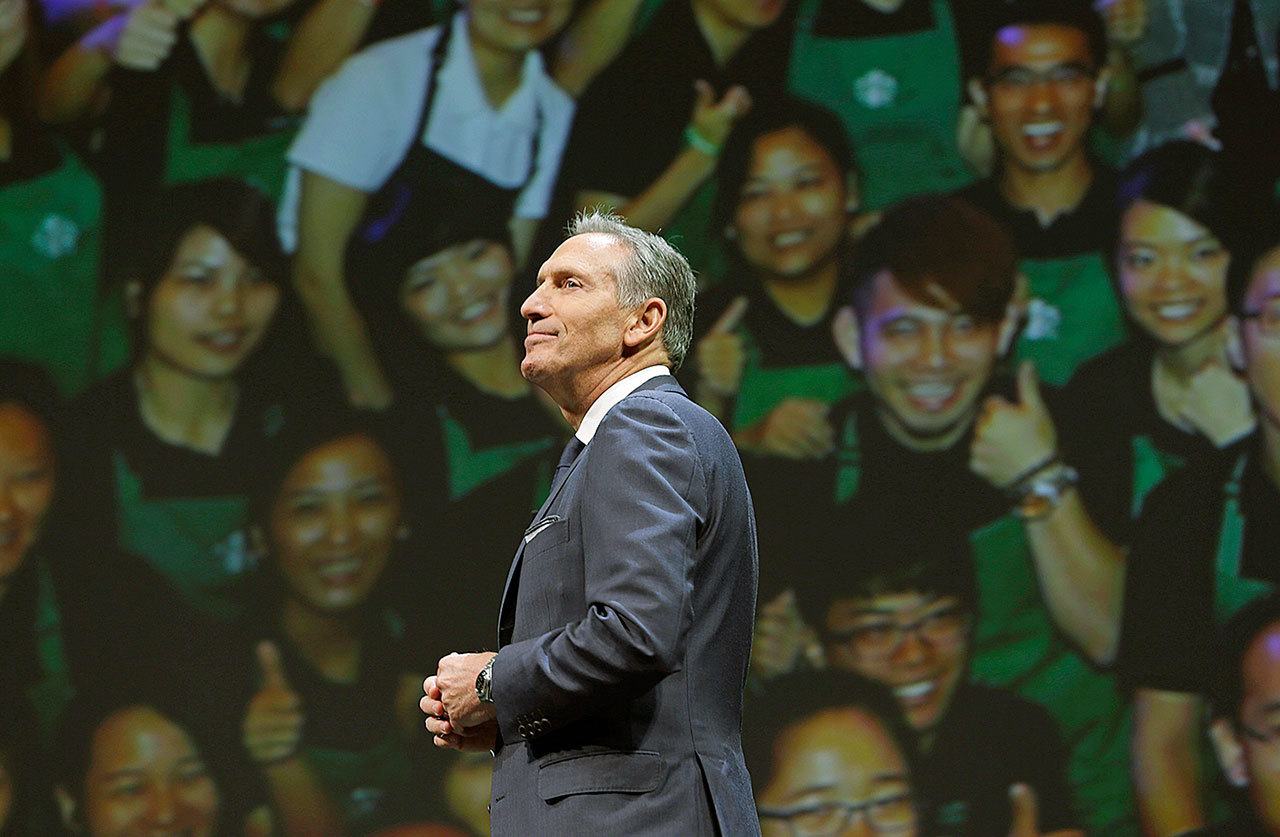The Washington Post
Starbucks announced Thursday that Howard Schultz plans to step aside as chief executive to focus on new initiatives at the coffee giant, an abrupt change for a man widely praised for putting a once adrift company back on track and guiding it through a period of rapid global expansion.
Schultz, who rarely shied away from putting Starbucks in the center of public policy debates, said he will stay on as chairman as he turns the CEO reins over to Kevin Johnson, the coffee chain’s chief operating officer. His sudden move revived speculation that he may one day try his hand at politics.
In a conference call with investors, Schultz declared that Johnson, with his background in the technology industry that includes a 16-year stint at Microsoft, “is better prepared to be the CEO on a go-forward basis than I am.”
Starbucks, like virtually every other retailer, is trying to adapt to an increasingly digital world. Starbucks has had unusual success at it, developing a widely used mobile payment app that has led to many headlines about how the coffee chain is transforming into a technology company. In tapping Johnson as chief executive, Starbucks is making a statement about its intentions to stay out in front in the digital realm.
When the leadership handoff takes place in April, Schultz will turn his focus to an ambitious project to make major brands out of two relatively new concepts in the Starbucks portfolio: Roasteries, sprawling facilities where the company roasts and packages premium coffees and offers a tasting-room-style experience, and Starbucks Reserve, cafes that serve the fancy coffee made at the roasteries. Schultz said the company has plans for at least 20 roasteries and 1,000 Reserve stores worldwide.
Schultz has been in his second stint as CEO job for nearly nine years – he initially stepped down in 2000 and then famously came back in early 2008. Interestingly, the first time he stepped away he also did so to take on a more strategic, high-level role: He became the company’s “chief global strategist.”
On Thursday’s call with investors, Schultz sought to emphasize that this time would be different.
In talking about his return as chief executive in 2008, amid a national financial crisis, Schultz said that the “management team at that time just did not have the capability to navigate through that difficult period.”
Now, however, he said he believes the leadership team is better equipped to fend for itself. And, he added, “on a personal level, I don’t think I was as prepared then as I am now.”
Wall Street has long been a big fan of Schultz. After news of the transition broke, Starbucks stock sank nearly 4 percent in after-hours trading.
The hallmark of Schultz’s leadership of Starbucks has long been his willingness to speak out about societal issues more than most CEOs of companies of its size.
In 2013, Schultz told an investor he could sell his shares if he didn’t like the company’s stance on same-sex marriage. He got credit for company programs such as offering college education benefits and promoting the hiring of young, minority workers and veterans. In March, he put together a series of online videos that offered feel-good lessons on civic engagement.
Other efforts didn’t work so well, such as his “Race Together” campaign to get baristas and customers speaking about race, which many saw as tone deaf, a company going one step too far in its effort to bring political values into the workplace.
That’s led some to question whether Schultz has aims on higher office. In March, he made some presidential-sounding remarks at the company’s annual stockholder meeting. Speaking in lofty terms about the lack of civility and leadership in the country, he said that “there are moments when I’ve had a hard time recognizing who we are and who we are becoming. We are facing a test not only of our character but of our morality as a people.”
He seemed to be alluding to the divisiveness of the 2016 presidential campaign. “What is the role and responsibility of all of us as citizens? We must do everything we can to reclaim and reimagine the American Dream and fill the reservoir back up – not with cynicism but with optimism, not with despair but with possibility, not with division but with unity,” he said.
In an op-ed in the New York Times in August, Schultz said he has “no intention of entering the presidential fray.”
Asked again about it in an interview on CNN recently, he didn’t entirely rule out a run, saying: “I’m still a young man. Let’s see what the future holds.” Later, Schultz added, “I determined for myself that at this time, I can do more as a private citizen and as the CEO of a public company to advance the causes that I think are important for the country and for our company.”
In the Thursday call with investors, Schultz said: “I’m not leaving the company. I’m here every single day.” A spokeswoman for Starbucks said Schultz has no plans to run for political office.
Johnson has worked as the company’s chief operating officer since 2015 and has been a member of the board of directors since 2009.
Previously, Johnson was chief executive of Juniper Networks and served on the National Security Telecommunication Advisory Committee.
Talk to us
> Give us your news tips.
> Send us a letter to the editor.
> More Herald contact information.

























